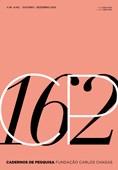Educational functions of e-parliaments: a longitudinal analysis of the Brazilian case
Keywords:
Internet, Brazil, Parliament, Education.Abstract
This article aims to analyse the Brazilian Legislative websites at state level (Legislative Assemblies), observing, for illustrative purposes, the National Congress (Chamber of Deputies and Federal Senate), in relation to the legislative functions: legislation, legitimation, representation, scrutiny, education, and participation. The investigation focuses on comparing the performance of these websites between 2014 and 2016, regarding how socioeconomic and political factors influence the index of each function mentioned above. The results indicate that, contrary to expectations, there was no lessening of the digital divide, especially in relation to the educational functions of e-parliaments.
Downloads
References
ASSIS, L. F. de. Educando para a cidadania: a experiência da Escola do Legislativo. Educação & Sociedade, v. 18, n. 59, p. 367-385, ago. 1997.
BRAGA, S. O papel das TICs na institucionalização das democracias: um estudo sobre a informatização dos órgãos legislativos na América do Sul com destaque para o Brasil. Brasília: Plenarium/Cedi, 2007.
BUTORI, M. M. R. Educação legislativa: as Escolas do Legislativo nas câmaras municipais de Minas Gerais. Revista Estudos Legislativos, Porto Alegre, ano 8, n. 8, p. 187-227, 2014.
CARVALHO, A. V. C. O Parlamento Jovem e a experiência das Escolas do Legislativo mineiro e da Câmara dos Deputados: o desenvolvimento da cultura cívica, propícia à democracia. Monografia (Especialização em Processo Legislativo) – Centro de Formação, Treinamento e Aperfeiçoamento, da Câmara dos Deputados, Brasília, 2009.
COLEMAN, S.; BLUMLER, J. G. The internet and democratic citizenship. Cambridge: Cambridge University Press, 2009.
COSSON, R. Escolas do Legislativo, escolas de democracia. Brasília: Câmara dos Deputados, 2008.
COSSON, R. Entrevista com Rildo Cosson. Revista Estágio-Visita, Brasília, ano 2, n. 6. abr./maio 2011. Disponível em: <http://www2.camara.leg.br/responsabilidade-social/edulegislativa/educacao-legislativa-1/educacao-para-a-democracia-1/apresentacao/textos>. Acesso em: set. 2015.
FARIA, C. O parlamento aberto na era da internet: pode o povo colaborar com o Legislativo na elaboração das leis? Brasília: Câmara dos Deputados, 2012. (Temas de Interesse do Legislativo, n. 18).
FARIA, C.; BRAGA, S. Parlamentos e novas tecnologias: fortalecendo a representação política através de ferramentas de e-participação. In: SATHLER, A.; BRAGA, R. (Org.). Legislativo pós-1988: reflexões e perspectivas. 1. ed. Brasília: Câmara dos Deputados, 2015. p. 223-263.
FERBER, P.; FOLTZ, F.; PUGLIESE, R. The internet and public participation: State Legislature web sites and the many definitions of interactivity. Bulletin of Science, Technology & Society, v. 25, n. 1, p. 86-93, 2005.
LESTON-BANDEIRA, C. Are ICTs changing parliamentary activity in the Portuguese parliament? The Journal of Legislatives Studies, v. 13, n. 3, p. 403-421, 2007a.
LESTON-BANDEIRA, C. The impact of the internet on parliaments: a legislative studies framework. Parliamentary Affairs, London, v. 60, n. 4, p. 655-674, 2007b.
LESTON-BANDEIRA, C. Parliamentary functions portrayed on European parliaments’ websites. Revista de Sociologia e Política, v. 17, n. 34, p. 13-27, 2009.
LESTON-BANDEIRA, C. Studying the relationship between Parliament and citizens. The Journal of Legislative Studies, v. 18, n. 3-4, p. 265-274, 2012.
LESTON-BANDEIRA, C.; THOMPSON, L. Mind the gap: using UK Parliamentary sources to enhance teaching. The Journal of Legislative Studies, v. 19, n. 3, p. 410-421, 2013.
MADRUGA, F. Escolas do Legislativo: a nova visão do parlamento brasileiro. Senatus, Brasília, v. 6, n. 1, p. 31-34, 2008.
MARQUES, F. P. J. A. Participação política e internet: meios e oportunidades digitais de participação civil na democracia contemporânea, com um estudo do caso do Estado brasileiro. 2008. 498 f. Tese (Doutorado em Comunicação e Cultura Contemporâneas) – Universidade Federal da Bahia, Salvador, 2008.
MARQUES JR., A. M. Educação legislativa: as Escolas do Legislativo e a função educativa do parlamento. Monografia (Especialização em Poder Legislativo) – Instituto de Educação Continuada da Pontifícia Universidade Católica de Minas Gerais e Escola do Legislativo da Assembleia Legislativa de Minas Gerais, Belo Horizonte, 2008.
MENDONÇA, R. F.; AMARAL, E. F. Deliberação online em consultas públicas? O caso da assembleia legislativa de Minas Gerais. Revista de Sociologia e Política, v. 22, p. 177-203, 2014.
NERI, M. et al. Mapa da inclusão digital. Rio de Janeiro: FGV, 2012.
NICOLAU, J. O sistema eleitoral de lista aberta no Brasil. Dados, Rio de Janeiro, v. 49, p. 689-720, 2006.
NORRIS, P. Digital divide: civic engagement, information poverty, and the internet worldwide. Cambridge: Cambridge University Press, 2001.
PERNA, A.; BRAGA, S. The invisible side of political participation. In: SOBAC, M. Z. (Org.). E-parliament and ICT-based legislation: concept, experiences and lessons. New York: IGI Global, 2012. p. 237-257.
RIBEIRO, W. Educação legislativa em resposta à crise política. Entrevista. Revista da Escola Legislativa do Rio de Janeiro, Rio de Janeiro, n. 8, p. 8-9, dez. 2014.
SANTOS, F. (Org.). O poder legislativo nos estados: diversidade e convergência. Rio de Janeiro: FGV, 2001.
Downloads
Published
How to Cite
Issue
Section
License
Copyright (c) 2016 Cadernos de Pesquisa

This work is licensed under a Creative Commons Attribution-NonCommercial 4.0 International License.
Authors who publish in this journal agree to the following terms:
a. Authors retain the copyright and grant the journal the right to first publication, with the paper simultaneously licensed under the Creative Commons Attribution license that allows the sharing of the paper with acknowledgment of authorship and initial publication in this journal.
b. Authors are authorized to assume additional contracts separately, for non-exclusive distribution of the version of the paper published in this journal (for example publishing in institutional repository or as a book chapter), with acknowledgment of authorship and initial publication in this journal.
c. Authors are allowed and encouraged to publish and distribute their paper on-line (for example in institutional repositories or on their personal page) at any moment before or during the editorial process, as this can generate productive changes, as well as increase the impact and citation of the published paper (See The Effect of Open Access).









